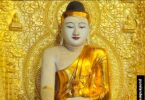Here is an inspiring incident behind a famous verse, which highlight Pure Land principles to some extent:
Dhammapada Verse 2 (Matthakundali Vatthu):
Manopubbangama dhamma
manosettha manomaya
manasa ce pasannena
bhasati va karoti va
tato nam sukha* manveti
chayava anapayini.All mental phenomena have mind as their forerunner; they have mind as their chief; they are mind-made. If one speaks or acts with a pure mind, happiness (sukha) follows him like a shadow that never leaves him.
[*Sukham / sukha: happiness, satisfactoriness, fortune, etc., and rebirth in the three upper planes of happy existence.]
The Story of Matthakundali
While residing at the Jetavana monastery in Savatthi, the Buddha uttered Verse (2) of this book, with reference to Matthakundali, a young Brahmin. Matthakundali was a young brahmin, whose father, Adinnapubbaka, was very stingy and never gave anything in charity. Even the gold ornaments for his only son were made by himself to save payment for workmanship. When his son fell ill, no physician was consulted, until it was too late. When he realized that his son was dying, he had the youth carried outside on to the verandah, so that people coming to his house would not see his possessions.
On that morning, the Buddha arising early from his deep meditation of compassion saw, in his Net of Knowledge, Matthakundali lying on the verandah. So when entering Savatthi for alms-food with his disciples, the Buddha stood near the door of the brahmin Adinnapubbaka. The Buddha sent forth a ray of light to attract the attention of the youth, who was facing the interior of the house. The youth saw the Buddha; and as he was very weak he could only profess his faith mentally. But that was enough. When he passed away with his heart in devotion to the Buddha he was reborn in the Tavatimsa celestial world.
From his celestial abode the young Matthakundali, seeing his father mourning over him at the cemetery, appeared to the old man in the likeness of his old self. He told his father about his rebirth in the Tavatimsa world and also urged him to approach and invite the Buddha to a meal. At the house of Adinnapubbaka the question of whether one could or could not be reborn in a celestial world simply by mentally professing profound faith in the Buddha, without giving in charity or observing the moral precepts, was brought up. So the Buddha willed that Matthakundali should appear in person; Matthakundali soon appeared fully decked with celestial ornaments and told them about his rebirth in the Tavatimsa world. Then only, the audience became convinced that the son of the brahmin Adinnapubbaka by simply devoting his mind to the Buddha had attained much glory. Then the Buddha spoke the verse, as above. At the end of the discourse Matthakundali and his father Adinnapubbaka attained Sotapatti Magga and Sotapatti Phala. Adinnapubbaka also donated almost all his wealth to the cause of the Buddha’s Teaching.
Notes with Pure Land Perspectives
[1] Though the Buddhas beseech us to be mindful of Amitabha Buddha (Amituofo), as stated in the Amitabha Sutra, the Buddhas are always mindful of sentient beings, so as to do what they can to help. When help seems absent, it is only because we lack the karmic conditions to be helped. This is as stated in ‘Great Power Bodhisattva’s Perfect Penetration Via Mindfulness Of Buddha’ below, from the Surangama Sutra. (Mindfulness of Amitabha Buddha is the easiest practice we can do to reconnect to all Buddhas, as stated in the Amitabha Sutra.)
十方如来,怜念众生,如母忆子;若子逃逝,虽忆何为?子若忆母,如母忆时,母子历生,不相违远。
The Thus Come Ones (Buddhas) in all the ten directions are mindful of living beings, out of pity for them, in the same way that a mother is mindful of her child. If the child runs away, of what use is the mother’s concern? But if the child remembers the mother in the same way that the mother remembers the child, then in life after life the mother and child will not be far apart.
[2] Like Shakyamuni Buddha, Amitabha Buddha also sends forth light, in all directions to touch and comfort beings in need. This is stated in the vows below, on how Amitabha Buddha’s unlimited light of compassion, merits and wisdom can aid us. Through mindfulness of Amitabha Buddha, we can experience this light.
设我得佛,光明有能限量,下至不照百千亿那由他诸佛国者,不取正觉。
Vow #12: If, when I [Dharmakara, who became Amitabha Buddha] attain Buddhahood, my light should be limited, unable to illuminate at least a hundred thousand kotis of nayutas of Buddha-lands, may I not attain perfect awakening.
设我得佛,十方无量不可思议诸佛世界众生之类,蒙我光明触其体者,身心柔软,超过天人,若不尔者,不取正觉。
Vow #33: If, when I attain Buddhahood, beings of all kinds in all immeasurable and inconceivable Buddha-lands of the ten directions, who receive my light, that touches their bodies, should not experience [blessings of peace, happiness,] gentleness and softness of body and mind that surpasses that of devas and humans, may I not attain perfect awakening.
[3] Matthakundali’s case reminds us of the importance and power of faith as a spiritual faculty, that can lead even to fortunate rebirths. As he was weak, he could only profess his faith mentally; not even verbally (e.g. by chanting or praising aloud), yet this was enough for securing a good rebirth as it is still the devotional practice of Buddha mindfulness. A good rebirth is possible via faithful mindfulness of the Buddha without doing charity or observing precepts in the moment as once one is sincerely mindful of Buddha, one would be practising both in that instant. This parallels that taught by Master Ouii (蕅益大师), the Ninth Chinese Patriarch of Pure Land Buddhism, as part of the practice of the Six Perfections by Buddha mindfulness, as below. (The easiest way of practising Buddha mindfulness is by verbal or silent recitation of the Buddha’s name.)
真能念佛,放下身心世界,即大布施。
With true ability to be mindful of the Buddha, letting go of body, mind and the world, is then great Generosity (i.e. Giving; Charity).
真能念佛,不负起贪嗔痴,即大持戒。
With true ability to be mindful of the Buddha, not again giving rise to greed, anger and delusion, is then great Upholding Of Precepts (i.e. Morality).
[4] Matthakundali was able to attain much glory as a deva in a heavenly plane because the faithful practice of Buddha mindfulness creates much merits, as the Buddhas are the most meritorious of all beings that we can be mindful of. In this sense, the Buddha is able to share his merits with those who are mindful of him.
[5] Based on the principle that Matthakundali was able to be reborn in Tavatimsa heaven due to the merits of being faithful to the Buddha in his last moments, if we are also mindful, specifically of Amitabha Buddha in our everyday life, and especially during our last moments, while being equipped with all Three Provisions of faith (in Amitabha Buddha), aspiration (to be reborn in his Pure Land) and practice (of true mindfulness of Amitabha Buddha), we can be able to be born in his Pure Land, which is more glorious than any heaven – where the path to Buddhahood is guaranteed. This is reflected in this vow:
设我得佛,自地以上,至于虚空,宫殿楼观,池流华树,国中所有一切万物,皆以无量杂宝,百千种香,而共合成。严饰奇妙,超诸天人。其香普薰十方世界,菩萨闻者,皆修佛行。若不尔者,不取正觉。
Vow #32: If, when I attain Buddhahood, from the ground to above, even to the sky, palace halls, towers, ponds, streams, flowering trees, and all myriad objects, are made of combinations of immeasurable variegated treasures and a hundred thousand kinds of fragrances [which radiate the Dharma]. These marvellous magnificent adornments surpass all things heavenly and human. Their fragrances universally pervade worlds of the ten directions and when bodhisattvas smell it, they all cultivate the Buddha’s practices. If this should not be so, may I not attain perfect awakening.
[6] Matthakundali’s case was a very fortunate one, where he was able to be mindful of the Buddha after being prompted by him personally in the nick of time due to his good karma, just before passing away. This illustrates the importance of having strong karmic affinity with at least one Buddha. It also illustrates the importance of death-proximate karma, in linking us to our destination of rebirth. If we are relatively more spiritually ‘distant’ from any Buddha, regular practice of Buddha mindfulness in everyday life is important – for creating strong karmic connections with Amitabha Buddha, so as to increase our ability to be ‘automatically’ mindful of him as much as possible, especially on our deathbeds. The light of Amitabha Buddha’s light is actually shining upon us all the time. We just need to practise well to experience it.
相关教理
Related Teachings:
《示念佛法门》
Guidance On The Dharma Door Of Mindfulness Of Buddha
https://purelanders.com/famen





